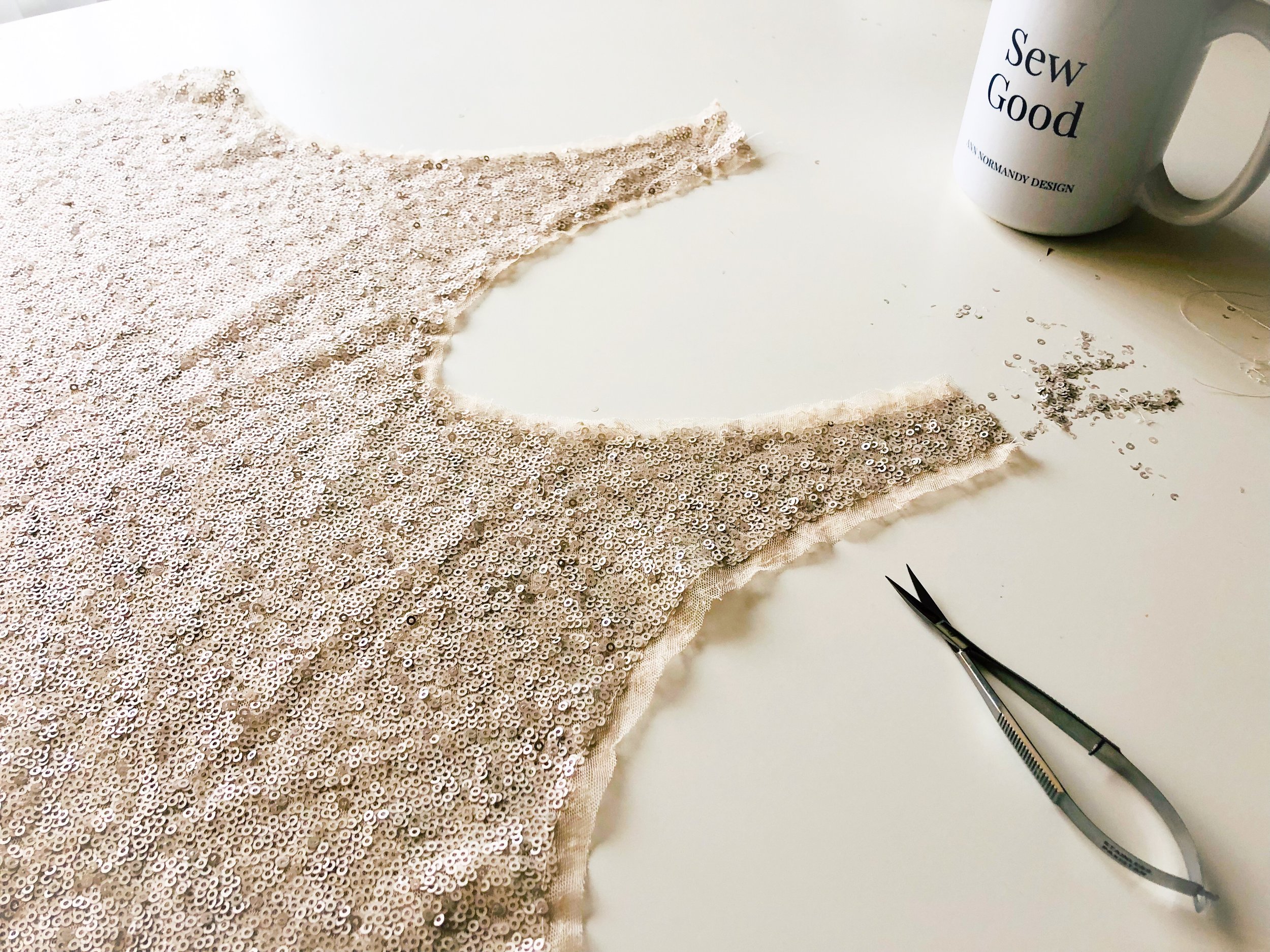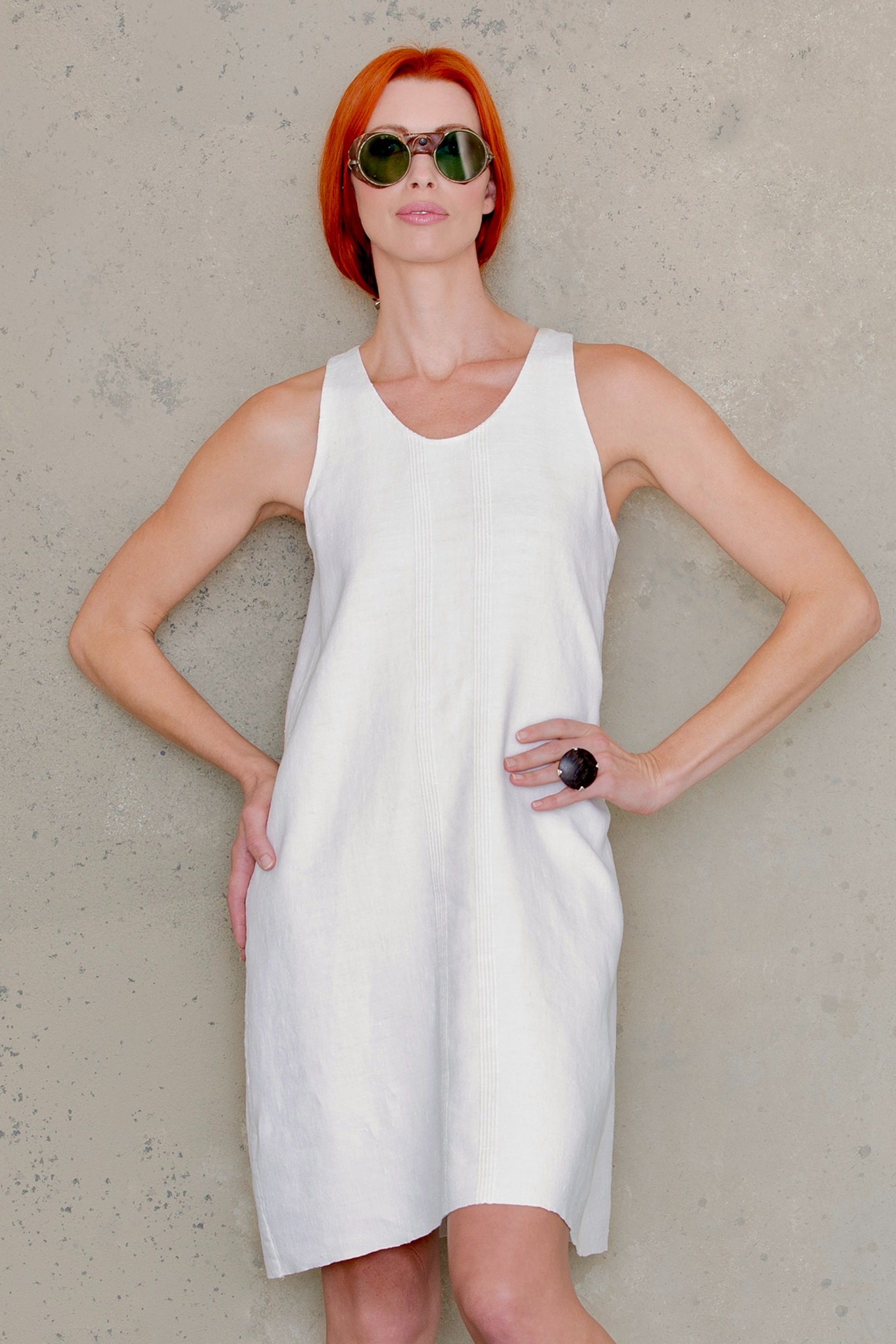Sewing Sequins: Sewing a Simple Dress Pattern with Maximum Glamour for Holiday or Wedding.
How to sew sequin fabric
Sequins are on-trend, and they are the perfect pairing with the Ann-Normandy Design Slip Dress sewing pattern.
Types of sequin fabric
• Sequins stitched on fabric, using invisible thread. (The dress featured in this article was sewn with stitched sequin fabric, “Save the Date” in Eggnog from Joann Fabrics)
• Sequins glued on cloth
Keep the pattern simple:
Select a pattern that does not have many pattern pieces, darts, and other details. The Ann Normandy Design Slip Dress PDF sewing pattern is the perfect pattern to use with sequin fabric, as it is only two pattern pieces and minimal details.
Tools:
• Sharp shears or rotary cutter blade dedicated for the use with sequins as cutting will dull the blade
• A small pair of snips to cut sequins within the seam allowance of the neckline and armscye (Snips used, Havel’s Snip-Eze #33010)
• Use a fresh, sharp needle, such as Schmetz Microtext 70/10. Have some extras on hand
Laying out and cutting:
• Spraying the edges of the pattern with basting adhesive spray will help the sewing pattern to temporarily tack and will keep it in place while cutting. Note: the adhesive will not wear off and will continue to stick
• Always cut in the direction of the pile/nap for a cleaner cut
• Cut single layer
Prepping the pattern pieces:
Run a stitch or basting stitch along the seam line and carefully remove the sequins from the seam allowances around the neckline and armscye (armhole) for cleaner, smoother and more comfortable edge. Clip the sequins in half, avoiding the thread. Some sequins are sewing continuously with one thread. You cut the thread, more sequins than you want to be removed will come out. (Snips used, Havel’s Snip-Eze #33010)
Sewing:
• Sew within the direction of the pile will achieve a smoother seam
• Stitch slowly
• Keep side seams simple to prevent bulk. You don’t have to remove the sequins from the side seams
The Ann Normandy Design Slip Dress pattern has flat felled seams. It is recommended to not create a flat felled seam and just finish, as mentioned above. The neckline and armscye on the sewing pattern is a double roll, just do a single 3/8” turn instead, for a clean edge.
Lining the Dress:
Lining the dress will save your skin from the picky feeling, as well as giving the fabric a little more coverage and giving it a clean finish.
Pressing:
Keep in mind, nearly all sequins are made of plastic and will melt. Press sequins gingerly, with a pressing cloth and a warm, not hot iron. Test first. When pressing a seam, I use my fingers or the thumb holder of my shears to push across the opened stitched seam to flatten the sequins. You may need to clip sequins within the stitching of the seam.
Sewing a challenging fabric such as sequin fabric is made more manageable by selecting an easy-to-sew pattern. Consider styling your sequin dress year round – for a summer wedding, wear it solo with jeweled sandals, for a winter holiday event, consider pairing with a faux fur wrap or cozy mohair cardigan jacket. You can even wear a sequin slip dress over skinny denim jeans or jeggings for a club or party look, with a leather moto jacket and heels. It’s a versatile year-round garment that is a statement piece in your wardrobe. Learning to sew with sequins is a great way to level up your sewing game.
Check out my Spring Trends with the Slip Dress Pattern blog post for more inspiration!




